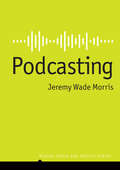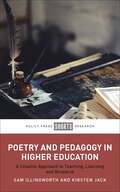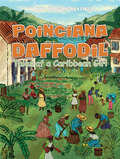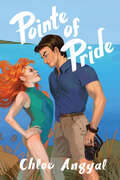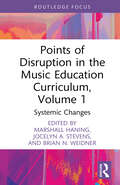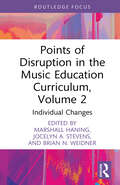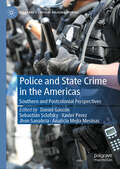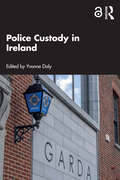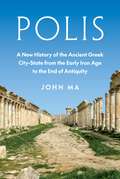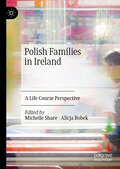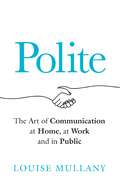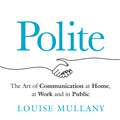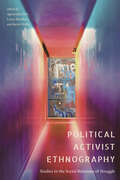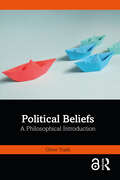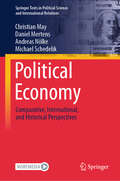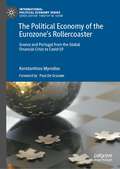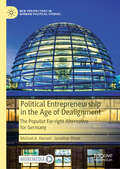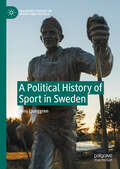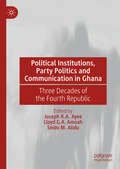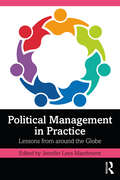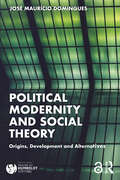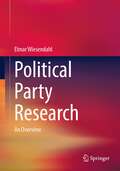- Table View
- List View
Podcasting (Digital Media and Society)
by Jeremy Wade MorrisPodcasting burst onto the media landscape in the early 2000s. At the time, there were hopes it might usher in a new wave of amateur and professional cultural production and represent an alternate model for how to produce, share, circulate and experience new voices and perspectives. Twenty years later, podcasting is at a critical juncture in its young history: a moment where the early ideals of open standards and platform-neutral distribution are giving way to services that prioritize lean-back listening and monetizable media experiences. This book provides an accessible and comprehensive account of one of digital media’s most vibrant formats. Focusing on the historical changes shaping podcasts as a media format, the book explores the industrial, technological and cultural components of podcasting alongside case studies of various podcasts, industry publications, and streaming audio platforms (e.g. Spotify, Google and Apple Podcasts). Jeremy Morris argues that as streaming platforms push to make podcasting more industrialized, accessible, user-friendly and similar to other audio media like music or audiobooks, they threaten podcasting’s early, though always unrealized, promises. This is the go-to introduction for students and researchers of media, communication and cultural studies, as well as readers who enjoy making and listening to podcasts.
Poems for Tortured Souls
by Liz IsonDear Reader, these poems are an introduction to the passionate words of some of the English language's most renowned poets. Inspired by today's greatest lyricist, Taylor Swift, this collection overflows with folklore, love, heartache, revenge and peace - the perfect balm for any tortured soul.Featuring poems by William Wordsworth, Emily Dickinson, Elizabeth Barrett Browning, William Shakespeare, Lewis Carroll and many more, this moody and melancholy anthology celebrates the most famous - and tortured - poets. WARNING: These poems might make you cry!
Poems for Tortured Souls
by Liz IsonDear Reader, these poems are an introduction to the passionate words of some of the English language's most renowned poets. Inspired by today's greatest lyricist, Taylor Swift, this collection overflows with folklore, love, heartache, revenge and peace - the perfect balm for any tortured soul.Featuring poems by William Wordsworth, Emily Dickinson, Elizabeth Barrett Browning, William Shakespeare, Lewis Carroll and many more, this moody and melancholy anthology celebrates the most famous - and tortured - poets. WARNING: These poems might make you cry!
Poetry and Pedagogy in Higher Education: A Creative Approach to Teaching, Learning and Research
by Sam Illingworth Kirsten JackThis book invites us to consider the profound impact that poetry can have in shaping personal and professional development in a higher education setting. Suitable for educators, learners, and practitioners, it offers a transformative learning approach in using poetry for teaching, assessment, research, and reflection. The book includes diverse examples, case studies, and practical exercises, demonstrating poetry's application in personal and professional development in a higher education setting. Each chapter guides readers through these processes, empowering them to integrate poetry into their own teaching and learning practices in a way that is creative, inclusive, and impactful.
Poinciana Daffodil: Tales of a Caribbean Girl
by Yvonne Morgan-McKenzieIntroducing Poinciana Daffodil, a beautiful Caribbean Girl from Corn Village. She is a member of a large family of people who are very hardworking and loyal to each other. This village is well known for their musical abilities and dancing skills. Poinciana is the youngest of her siblings and is always friendly and helpful.
Pointe of Pride
by Chloe AngyalCarly Montgomery has only one goal as she arrives in Sydney, Australia: Be the world's best maid of honor. And then, when she gets back to New York City, she's going to figure out how to get promoted so she doesn't spend the rest of her ballet career in the corps de ballet playing Peasant Maiden #4. But the second she steps off the plane, she runs into trouble—and into Nick Jacobs, the most uptight, judgmental, inconveniently attractive man she's ever met. And to their mutual horror, Nick is also in Sydney for a wedding. The same wedding. In which he is the best man. Carly will do anything for her best friend, including running all over Sydney with Nick—Nick who has his life together, Nick who's made the transition out of ballet into photography so perfectly, Nick who has the most irritatingly sharp cheekbones and stormy blue eyes. And when the director of New York Ballet announces that she'll be making her decision about promotions ahead of schedule, Carly chooses to stay in Sydney, even if it means shelving her pride to ask Nick for help.Nick Jacobs is coming back to Sydney with a secret. His life in Paris, where he recently retired from ballet, has fallen apart. With no girlfriend and no new career to speak of, Nick can't bear to tell his friends at home the humiliating truth. And after fifteen years dancing overseas, what does home even mean anymore? Nick doesn't want to team up with Carly Montgomery, a human hurricane who creates chaos every time she walks in the room, but sparring with her makes him feel the most alive he's felt in months. When she asks him for help securing her promotion, he sees an opportunity to kickstart his own flagging career. Looking at Carly through his lens all day starts to change how Nick sees her, and soon, he can't stop staring. Carly's a human hand grenade, but suddenly Nick wouldn't mind pulling the pin.When she finds out the truth about him, though, the explosion might destroy them both.
Points of Disruption in the Music Education Curriculum, Volume 1: Systemic Changes (CMS Pedagogies and Innovations)
by Marshall Haning Jocelyn A. Stevens Brian N. WeidnerFor decades, scholars in the field of music education have recognized the need for growth and change in our approach to teaching music, yet despite these calls for change, the music education curriculum today remains remarkably similar to that of a century ago. Points of Disruption in the Music Education Curriculum, Volume 1: Systemic Changes is one of two volumes that bring together applied suggestions, analyses, and best practices for disrupting cycles of replication in the curriculum of K-12 and collegiate music education programs in the United States and beyond, considering disruption as a force for positive change. Identifying specific strategies for interrupting or reimagining traditional practices, the contributors provide music teachers and music educators with a variety of potential practical approaches to creating changes that foster a better musical education at all levels of the curriculum.This first volume focuses on systemic changes, including topics like professional development, hiring practices, ableism and universal design, rhizomatic learning, and how to implement disruption across the music education profession. Each chapter contains specific action steps and suggestions for implementation. Bringing together five thought-provoking chapters, this concise volume offers a diverse set of concrete strategies that will be useful to a wide range of music education stakeholders, including teachers, administrators, and curriculum designers.
Points of Disruption in the Music Education Curriculum, Volume 2: Individual Changes (CMS Pedagogies and Innovations)
by Marshall Haning Jocelyn A. Stevens Brian N. WeidnerFor decades, scholars in the field of music education have recognized the need for growth and change in our approach to teaching music, yet despite these calls for change, the music education curriculum today remains remarkably similar to that of a century ago. Points of Disruption in the Music Education Curriculum, Volume 2: Individual Changes is one of two volumes that bring together applied suggestions, analyses, and best practices for disrupting cycles of replication in the curriculum of K-12 and collegiate music education programs in the United States and beyond, considering disruption as a force for positive change. Identifying specific strategies for interrupting or reimagining traditional practices, the contributors provide music teachers and music educators with a variety of potential practical approaches to creating changes that foster a better musical education at all levels of the curriculum.This second volume focuses on changes that can be implemented by individual educators, covering topics including transcultural approaches, student-teacher power relations, methods courses, integrated music education, and administrator support of teacher agency, student–teacher power relations, and reimagining music education. Bringing together 6 thought-provoking chapters, this book offers a diverse set of concrete strategies that will be useful to a wide range of music education stakeholders, including teachers, administrators, and curriculum designers.
Police and State Crime in the Americas: Southern and Postcolonial Perspectives (Palgrave's Critical Policing Studies)
by Daniel Gascón Sebastián Sclofsky Xavier Perez Jhon Sanabria Analicia Mejia MesinasThis book advances a much-needed “postcolonial” framework in analyzing the police. It seeks to deepen our understanding of the police role in maintaining Western global domination throughout the American region despite the violent end of colonial rule. Building on Chevigny's (1995) classic study, this book seeks to draw renewed attention to the role of police in perpetrating state violence and serving as the tip of the spear of state power. It seeks to understand the construction of marginality and the multiple and intersecting structures of colonial domination, before shining a light directly on the crimes of the state, in an attempt to hold criminal state organizations to account. It draws on interdisciplinary perspectives and methodologies that center marginalized and colonized experiences and allows for the development of countercolonial knowledge. It speaks to academics and students in criminology, sociology, political science, and law, as well as toethnic and area studies programs, such as Chicano/Latino and Latin American Studies, and to police administrators and policymakers.
Police Custody in Ireland
by Yvonne DalyPolice Custody in Ireland brings together experts from policing studies, law, criminology, and psychology, to critically examine contemporary police custody in Ireland, what we know about it, how it operates, how it is experienced, and how it might be improved.This first-of-its-kind collection focuses exclusively on detention in Garda Síochána stations, critically examining it from human rights and best practice perspectives. It examines the physical environment of custody, police interview techniques, existing protections, rights, and entitlements, and experiences of specific communities in custody, such as children, ethnic minorities, non-English speakers, the Mincéir/Traveller community, and those with intellectual disabilities or Autism Spectrum Disorder. Police Custody in Ireland gives a snapshot of garda custody as it is now and makes important recommendations for necessary future improvements.An accessible and compelling read, this book will be of interest to those engaged in policing and criminology, as well as related areas of interest such as human rights, youth justice and disability studies.The Open Access version of this book, available at http://www.taylorfrancis.com, has been made available under a Creative Commons [Attribution-Non Commercial-No Derivatives (CC-BY-NC-ND)] 4.0 license.
Polis: A New History of the Ancient Greek City-State from the Early Iron Age to the End of Antiquity
by John MaA definitive new history of the origins, evolution, and scope of the ancient Greek city-stateThe Greek polis, or city-state, was a resilient and adaptable political institution founded on the principles of citizenship, freedom, and equality. Emerging around 650 BCE and enduring to 350 CE, it offered a means for collaboration among fellow city-states and social bargaining between a community and its elites—but at what cost? Polis proposes a panoramic account of the ancient Greek city-state, its diverse forms, and enduring characteristics over the span of a millennium.In this landmark book, John Ma provides a new history of the polis, charting its spread and development into a common denominator for hundreds of communities from the Black Sea to North Africa and from the Near East to Italy. He explores its remarkable achievements as a political form offering community, autonomy, prosperity, public goods, and spaces of social justice for its members. He also reminds us that behind the successes of civic ideology and institutions lie entanglements with domination, empire, and enslavement. Ma&’s sweeping and multifaceted narrative draws widely on a rich store of historical evidence while weighing in on lively scholarly debates and offering new readings of Aristotle as the great theoretician of the polis.A monumental work of scholarship, Polis transforms our understanding of antiquity while challenging us to grapple with the moral legacy of an idea whose very success centered on the inclusion of some and the exclusion of others.
Polish American History after 1939: Polish American History from 1854 to 2004, Volume 2 (ISSN)
by Joanna WojdonThis book is the second in a three-part, multi-authored study of Polish American history which aims to present the history of Polish Americans in the United States from the beginning of Polish presence on the continent to the current times, shown against a broad historical background of developments in Poland, the United States and other locations of the Polish Diaspora.According to the 2010 US Census, there are 9.5 million persons who identify themselves as Polish Americans in the United States, making them the eighth largest ethnic group in the country today. Polish Americans, or Polonia for short, has always been one of the largest immigrant and ethnic groups and the largest Slavic group in America. Despite that, common knowledge about its social and political life, culture and economy is still inadequate – in Academia and among the Polish Americans themselves. The book discusses the major themes in Polish American history, such as organizational life and the structure of the community facing subsequent waves of immigration from Poland, its leadership and political involvement in Polish and American affairs, as well as living and working conditions, and the everyday life of families and communities, their culture, ethnic identity and relations with the broadly understood American society, starting from the outbreak of World War 2 in Poland in September, 1939, and ending with the highlights of the 21st-century developments. It depicts Polish Americans’ transition from a ‘minority’ through ‘ethnic’ group to Americans who take pride in their symbolic ethnicity, maintained intentionally and manifested occasionally.This volume will be of great value to students and scholars alike interested in Polish and American History and Social and Cultural History.
Polish Families in Ireland: A Life Course Perspective
by Alicja Bobek Michelle ShareThis volume explores the family formation and life course of Polish people in Ireland, who make up the largest immigrant group in Ireland. Chapters address key dimensions of the life course in three parts focusing on childhood and youth, adulthood and parenting, and mid-life and futures. Contributions investigate the experiences of children and youth attending school and understanding their identities, the changing nature of families and family support, how families might engage with welfare institutions, and more. Through the life course approach, the book moves beyond the paradigm of studying the Polish population as economic migrants and instead analyzes and illustrates the lives of Polish families living in Ireland since EU enlargement.
Polite: The Art of Communication at Home, at Work and in Public
by Louise MullanyThe first ever mass-market book on politeness and the important role it plays in our work, relationships and lives, from professor and pioneer of Politeness Theory, Louise MullanyAre women really more polite than men?What is the best way to apologise?And when is it OK to swear?Politeness rules our day-to-day lives, whether it's speaking to colleagues about issues at work, dealing with difficult family members or wondering if you should eat the last piece of pie. For years, Professor Louise Mullany has been examining the prevalence and power of politeness in our everyday speech and actions, and discovering what this says about us.In Polite, Louise shows how the unseen science of politeness governs everything we do, from what we say to how we act, and reveals how a better understanding of the rules and norms of politeness can help us in all aspects of our work, leisure and home lives.And, in doing so, she answers the age-old question... are politeness standards really declining?
Polite: The Art of Communication at Home, at Work and in Public
by Louise MullanyThe first ever mass-market book on politeness and the important role it plays in our work, relationships and lives, from professor and pioneer of Politeness Theory, Louise Mullany'Fascinating and insightful. I'm grateful to have read it, and pleased to have learnt so much in the process. I would - politely - encourage you to do the same.' Jon McGregorAre women really more polite than men?What is the best way to apologise?And when is it OK to swear?Politeness rules our day-to-day lives, whether it's speaking to colleagues about issues at work, dealing with difficult family members or wondering if you should eat the last piece of pie. For years, Professor Louise Mullany has been examining the prevalence and power of politeness in our everyday speech and actions, and discovering what this says about us.In Polite, Louise shows how the unseen science of politeness governs everything we do, from what we say to how we act, and reveals how a better understanding of the rules and norms of politeness can help us in all aspects of our work, leisure and home lives.And, in doing so, she answers the age-old question... are politeness standards really declining?'A must-read for anyone interested in becoming a more effective communicator.' Michael Haugh, The University of Queensland
Political Activist Ethnography: Studies in the Social Relations of Struggle
by Agnieszka Doll Laura Bisaillon Kevin WalbyAs activists strategize, build resistance, and foster solidarity, they also call for better dialogue between researchers and movements and for research that can aid their causes. In this volume, contributors examine how research can produce knowledge for social transformation by using political activist ethnography, a unique social research strategy that uses political confrontation as a resource and focuses on moments and spaces of direct struggle to reveal how ruling regimes are organized so activists and social movements can fight them. Featuring research from Aotearoa (New Zealand), Bangladesh, Canada, Poland, South Africa, and the United States on matters as diverse as anti-poverty organizing, prisoners' re-entry, anti-fracking campaigns, left-inspired think-tank development, non-governmental partnerships, involuntary psychiatric admission, and perils of immigration medical examination, contributors to this volume adopt a “bottom-up” approach to inquiry to produce knowledge for activists, not about them. A must-read for humanities and social sciences scholars keen on assisting activists and advancing social change.
Political Beliefs: A Philosophical Introduction
by Oliver TraldiAnyone who’s had an argument about politics with a friend may walk away wondering how this friend could possibly hold the beliefs they do. A few self-reflective people might even wonder about their own political beliefs after such an argument. This book is about the reasons that people have, and could have, for political beliefs: the evidence they might draw on, the psychological sources of their views, and the question of how we ought to form our political beliefs if we want to be rational.The book’s twenty-four chapters are divided into four larger parts, which cover the following: (1) the differences between political and other types of beliefs, (2) theories of political belief formation, (3) sources of our political beliefs and how we might evaluate them, and (4) contemporary phenomena – like polarization, fake news, and conspiracy theories – related to political beliefs. Along the way, the book addresses questions that will arise naturally for many readers, like: Does the news you choose to watch and your own social media leave you stuck in an “information bubble”? Are you committed to a certain ideology because of the history of your society? Are people who believe “fake news“ always acting irrationally? Does democracy do a good job of figuring out what’s true? Are some political beliefs good and some evil? As the book investigates these and other questions, it delves into technical, philosophical topics like epistemic normativity, the connection between belief and action, pragmatic encroachment, debunking arguments, and ideology critique. Chapter summaries and discussion questions will help students and all interested readers better grasp this new, important area on the border of politics and philosophy.Key Features Systematically covers the political turn in contemporary epistemology and integrates it with important work in other fields (like psychology and political science) In addition to deep coverage of the nature of political belief, includes material on the ethics of political belief and how we ought to form our beliefs Approaches topics that naturally interest students like political disagreement, fake news, conspiracy theories, and the morality of belief Provides a Conclusion and Discussion Questions at the end of each chapter, prompting student readers to think more clearly and deeply about the material they’ve read The Open Access version of this book, available at www.taylorfrancis.com, has been made available under a Creative Commons Attribution (CC-BY) 4.0 International license.
Political Economy: Comparative, International, and Historical Perspectives (Springer Texts in Political Science and International Relations)
by Christian May Daniel Mertens Andreas Nölke Michael SchedelikThis textbook offers a comprehensive introduction to Political Economy. It combines comparative,international and historical perspectives into a holistic framework of analysis. Drawing on the workof Karl Polanyi, the book shows how capitalist economies differ around the globe and how they areembedded in the international economic order. Through a critical-institutionalist lens, it helps toaccount for the evolution of contemporary capitalism and addresses current topics at the intersection of political science and economics.Students and instructors can draw on supplementary material, such as Power Point slides withall figures and tables as well as the Springer Nature Flashcards app with exercises.
The Political Economy of the Eurozone’s Rollercoaster: Greece and Portugal from the Global Financial Crisis to Covid-19 (International Political Economy Series)
by Konstantinos MyrodiasGlobal crises throughout history have shaken humanity and transformed economies and societies. The Eurozone faced two such crises soon after its foundation. This book brings new insights regarding the Eurozone’s response to the Global Financial Crisis in 2008 and the Covid-19 pandemic and its effectiveness in dealing with the macroeconomic imbalances in Europe. Is the Eurozone more resilient now? This book is an indispensable addition to the literature on the recent global crises and the Eurozone for both academics and policymakers who are eager to delve deeper into these vital questions.
Political Entrepreneurship in the Age of Dealignment: The Populist Far-right Alternative for Germany (New Perspectives in German Political Studies)
by Michael A. Hansen Jonathan OlsenThis book traces the rise of the far-right Alternative for Germany (AfD) from its inception in 2013 to its re-election to the Bundestag in 2021, emphasising the party’s nature as a “populist issue entrepreneur” and covering the three major crises that have shaken European party politics – the Eurozone crisis, the so-called refugee crisis and the COVID pandemic. Currently, books on the AfD are largely limited to historical accounts and surface-level analyses of the party. This volume is both empirically rigorous and conceptually nuanced: it seeks to understand the party’s political trajectory and its appeal to its supporters by using advanced quantitative methodologies to analyse voter behaviour, as well as by interpreting the party’s communication strategies through mixed empirical methods. It embeds this account within a well-grounded theoretical argument. The argument emphasises three important explanatory conditions – a favourable political opportunity structure, issue entrepreneurship, and the party’s stages of political development.
A Political History of Sport in Sweden (Palgrave Studies in Sport and Politics)
by Jens LjunggrenThis book presents a history of Swedish sport, highlighting in particular the relationship between sport politics and people’s changing attitudes towards sport from the eighteenth century until today. It scrutinizes the interaction between sport politics and people’s different approaches to sport in everyday life. By investigating how different ways of pursuing and conceptualizing sport have progressed and interacted, and how they have influenced as well been influenced by sport politics, this book discerns the role of both governmental and municipal politics in the development of sport in Sweden.
Political Institutions, Party Politics and Communication in Ghana: Three Decades of the Fourth Republic
by Joseph R. A. Ayee Lloyd G. A. Amoah Seidu M. AliduThis book is one of two volumes that examines the successes and failures of the Ghanaian Fourth Republic from a political, public administration and public policy viewpoint. Published to coincide with the thirtieth anniversary of the founding of the Fourth Republic, these volumes bring together leading scholars to consider the political achievements and failures that have taken place in the country since the early 1990s, and what these tell us about the state of politics and democracy in twenty-first century Ghana and beyond. This volume focuses on party politics, political communication and public policy. It assesses themes such as interest groups, electoral politics, democratization, constitutionalism, the role of the media, and gender and politics. The volume also places Ghana in a global context, demonstrating how lessons learnt from the country can be applied elsewhere around the world, and what is unique about the Ghanaian political experience. It will appeal to all those interested in public policy, public administration and African politics.
Political Management in Practice: Lessons from around the Globe
by Jennifer Lees-MarshmentAll organisations manage people, and politics is no different. Campaigns, parties, and government all need to manage people and resources to try to get things done. Of course, the extent to which politics is managed effectively is debatable. Recently public awareness of problematic HR in parliaments and government has grown as media reports of problems emerge. Such problematic practice is not surprising given that orientation and training of political practitioners by parties and parliament is hindered by a lack of academic research.This comprehensive volume lays out and builds upon core theoretical foundations in the field of political management, offering a wide range of in-depth empirical research with multiple authors and chapters from different disciplinary perspectives and countries. With authors from political management programmes, political marketing, management, political psychology, and public administration, the book seeks not just to survey a topic or existing literature, but to stimulate research in the area.This book will be highly useful for graduate students, researchers, and professionals in a variety of areas including political management, political marketing, applied politics, political science, management, political psychology, and public administration.
Political Modernity and Social Theory: Origins, Development and Alternatives
by Jose Maur¡cio DominguesModern liberal democracy and authoritarian collectivism have known diverse political regimes; autocratic, oligarchic or democratic, they each consist of a mixed, partly oligarchic regime in which plebeian politics are subordinated. With authoritarian collectivism’s defeat, a return to modernity has produced one more hybrid configuration.An in-depth investigation of political modernity and how it is differentiated from other forms of society, this book researches its origins and trajectory as a specific dimension of modern civilisation – articulating a renewed critical theory through an analysis of rights and law, politics, state and autonomy, social reproduction, crisis and political change.Examining these diverse aspects, Political Modernity and Social Theory proposes an encompassing and far-reaching approach spanning past and present – stressing radical plebeian democracy and maintaining a strong opening to the future and to possible alternatives to modernity.The Open Access version of this book, available at www.taylorfrancis.com, has been made available under a Creative Commons Attribution (CC-BY) 4.0 license.
Political Party Research: An Overview
by Elmar WiesendahlThe book by the well-known German party researcher Elmar Wiesendahl presents the development, theoretical perspectives, research approaches, and fields of investigation in party research in light of the state of the art.
